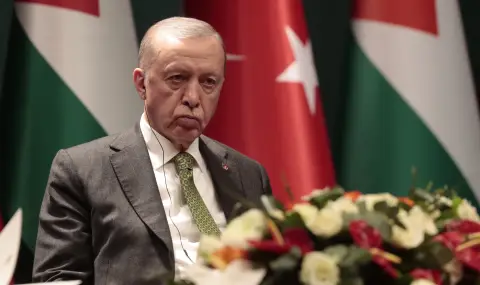Fears that war in the Middle East will escalate have been heightened since Iran attacked Israel - something many had warned of for months.
Iran is one of the regional powers in the Middle East. Another such is Turkey. Ankara is on the side of the Palestinians in the war in the Gaza Strip, which Israel launched after Hamas carried out a terrorist act on the country's territory. Turkish President Recep Erdogan has repeatedly accused Israel of committing "genocide". He does not consider Hamas a terrorist group and calls the people of Gaza "our Palestinian brothers”.
"Israel wants to attack us"
Recently, Erdogan tried to stoke fears in Turkish society as well: in a speech to parliament on October 1, 2024, he accused Israel of wanting to attack Turkey. "The Israeli government, which has gone mad in the Holy Land, will probably target our homeland with its religious fanaticism after Palestine and Lebanon," he said. According to Erdogan, Israeli Prime Minister Benjamin Netanyahu dreams of occupying Anatolia and "chasing a utopia".
Experts define this scenario as unrealistic. "It's not possible," says political scientist Celine Nasi of the London University of Economics. "Turkey is a member of NATO. An attack on Turkey would mean a confrontation with the Alliance and the US. Besides, Israel has no reason to want to attack Turkey. With his words, Erdogan is trying to consolidate his supporters and show solidarity with the Palestinians. Turkey has the second largest army in NATO - Ankara is not only strong militarily, but also an important ally of the US - as is Israel.
But Erdogan's intentions are different, according to Ilter Turan, a professor of international relations at Istanbul's Bilgi University. "The president instrumentalizes foreign policy for his domestic political goals. Israel has no such intentions. Turan believes that the Turkish government is trying to divert people's attention while there are serious political failures in the country. Erdogan himself has lost some of his support since the last elections, and the country continues to be in an economic crisis.
Will Turkey intervene?
According to Turan, the probability of Turkey joining the conflict is zero. "Turkey will not actively participate in it, because Ankara has no desire to wage war," the expert is categorical. Turkey would not approve of an Israeli retaliatory strike against Iran because it maintains friendly relations with Tehran. Ankara can provide moral support to Iran, but nothing more than that.
"As the Turkish government supports the Palestinians and opposes Israel's actions, there is now a false impression that Ankara supports Iran and its militias. This is misleading,” says Celine Nasi. Turkey is currently concentrating on stabilizing the economy, and a regional conflict would only bring more instability. Therefore, Turkey is not expected to intervene in Gaza or Lebanon. "Turkey does not want a military conflict with Israel," Nasi believes.
Competitors that are respected
Turkey, Iran and Saudi Arabia are now "in competition, as they were in the past”, according to former diplomat Mithat Rende. He was the ambassador of Turkey to Qatar and is well aware of the geopolitical dynamics in the region. Turkey maintains relations with Iran with "respect and care", although Tehran and Ankara often have different views on various regional conflicts.
"Turkey does not want Iran to expand its influence in the region with the help of the groups that Tehran supports and arms. At the same time, Turkey shares the desire of other local governments to prevent the scenario in which Iran becomes a nuclear power, Rende explains.
How does Turkey view Hezbollah?
The fundamental difference between the two regional powers is how they interpret Islam. Turkey is a predominantly Sunni country and Erdogan's government tends to support Sunni groups such as Hamas, which the EU and the US designate as a terrorist organization. The Iranian population is mainly Shia and the regime supports Shia groups such as Hezbollah. These religious and political differences also determine the geopolitical relations between the two countries.
The difference has also been felt in recent months - for example, in how they mark the murder of the leaders of the two groups in Turkey. When Hamas leader Ismail Haniyeh was killed, Erdogan declared national mourning. After Hezbollah leader Hassan Nasrallah was killed, Erdogan expressed solidarity with the Lebanese but did not mention Nasrallah by name. "It is understandable and not surprising - the level of concern is completely different,” says Turan.
Author: Burak Yunveren
